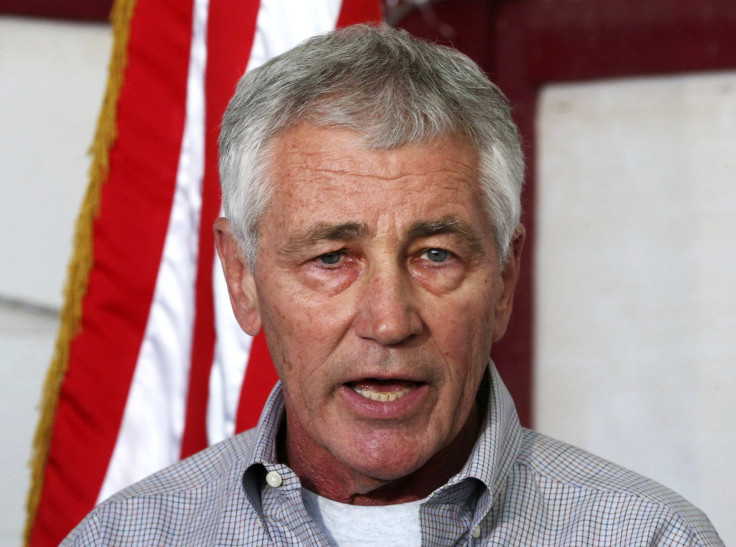Hagel In Baghdad As US Sees Momentum Against Islamic State

(Reuters) - U.S. Defense Secretary Chuck Hagel arrived in Baghdad on Tuesday as the United States expands its presence and touts progress against Islamic State militants four months after starting a campaign of air strikes in Iraq.
Hagel is the first U.S. secretary of defense to visit Iraq since President Barack Obama ordered American troops out of the country in 2011. Obama started ordering troops back to Iraq this summer, to help counter the advance of Islamic State.
Speaking to reporters ahead of the visit, Hagel said the Iraqi army and Kurdish forces were gaining momentum.
"This is a long term effort. It's difficult. There will be setbacks. There will be victories. So I think that's where we are and I look forward to getting some first-hand assessments," he told reporters in Kuwait on Monday.
Last month Obama authorized roughly doubling the number of U.S. ground forces to 3,100 as the military expands the reach of its advisers and starts training Iraqi and Kurdish forces.
"We have a role to play here but always our role has to be a support role... It is their country. They have to lead," Hagel told U.S and Australian soldiers at Baghdad airport.
He said the United States was training, assisting and advising Iraqi forces but the key to progress was an inclusive government in Baghdad that could rally all Iraqis.
Since taking office in September, Shi'ite Prime Minister Haider al-Abadi has worked to build alliances with Sunni tribes and also reached a deal on oil exports with the semi-autonomous Kurdish region after months of dispute.
Hagel was due to meet Abadi and Defense Minister Khaled al-Obeidi during his visit.
The U.S. commander for Operation Inherent Resolve in Iraq and Syria, Lieutenant General James Terry, said Washington's coalition allies would also send about 1,500 troops to help train and advise local forces.
Since their June offensive, Islamic State's Sunni militants have had little success breaking beyond the solidly Sunni Muslim provinces of Anbar in the west and Salahuddin north of Baghdad, as well as the strongly Sunni province of Nineveh, home to the city of Mosul which the Islamists overran in June.
Iraqi and Kurdish forces have made gains, including securing Mosul dam.
Terry said while the Islamic State still conducted limited attacks the group appeared broadly "on the defense, trying to hold what they have gained".
"When you look at some places out in Anbar, it’s a little bit stalemated out there. And we’ve got some work to do. And I think it’s do-able."
© Copyright IBTimes 2024. All rights reserved.





















